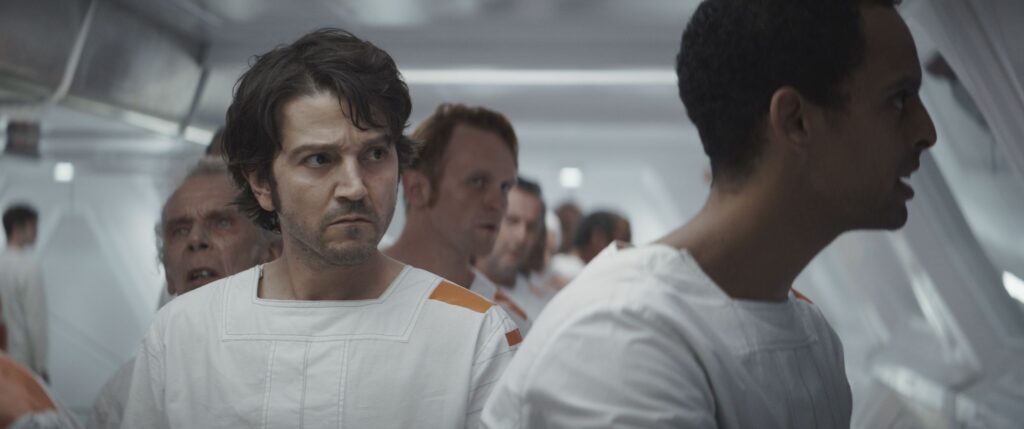Despite (or perhaps because of) Andor’s distinct lack of Jedi, Sith, or a certain overexposed bounty hunter, it has consistently been one of the Star Wars franchise’s most riveting entries that’s only become even more compelling over the course of its first season. Even though the show’s twists and turns have made for some excellent television, there hasn’t been anywhere near as much all-consuming hype or fracas about it from the Star Wars fandom. Depending on how you look at it, this is either a bug or a feature.
Andor’s creator Tony Gilroy and series writer Beau Willimon certainly hope that people are watching the show and getting a kick out of it. But they aren’t all that concerned about the capital-D discourse around it because while understanding Andor’s big ideas is certainly part of appreciating the show, to them, that always comes second to understanding how everything about the story stems from small character decisions.
Though Andor’s an in-depth character study of its titular rebel-in-the-making, it’s also been a fascinating exploration of what fascistic power structures and the resistances opposing them can look like up close and on the ground level of history. Figures like Cassian Andor (Diego Luna), Mon Mothma (Genevieve O’Reilly), and Dedra Meero (Denise Gough) are just individual people, but they’re all also in the process of becoming symbolic heroes and legendary villains simply by acting and trusting their instincts — a reality few of them can fully grasp because they’re so close it.
When I spoke with Gilroy and Willmon recently, they described how being that close to these characters was an essential part of their creative process while conceiving Andor. That closeness, Gilroy said, often made it difficult for them to sometimes take a very zoomed-out look at how some of Andor’s messages might play.
“We really build out from characters, and we build them from breadcrumbs to breadcrumbs to breadcrumbs, plot-wise,” Gilroy said. “And we hope along the way that instinctively, or by good luck, or by unintended subliminal intention, we have ended up with something that people want to discuss and is worthy of discussion. But we don’t start off with an agenda.”
“Sure, you can give your life, or you could have a living death”
More than a story about war, Andor’s a tale about the very process of becoming something other than what you already are, Gilroy and Willimon told me, and as they were mapping out the shape of the show’s first season, they found themselves repeatedly coming back to the idea of sacrifice. Delving into just what all Cassian would sacrifice to survive as he went from being an orphan to a quick-witted con man has been one of Andor’s ways of illustrating the evolution that he’s going through. But while Cassian’s sacrifices might be the most obvious ones that Andor’s spotlighted, Willimon emphasized that he truly isn’t the only one.
“Sure, you can give your life, or you could have a living death, like Luthen,” Willimon said. “A sunless life without love. It’s a form of death. Mon Mothma, we don’t know what she’ll do, but are you willing to sacrifice your own daughter by consigning her to the same fate that you had to endure when you were 15 years old?”
Sacrifice in service to a greater good might not be what immediately comes to mind during Andor’s scenes featuring simpering Galactic overachiever Syril Karn (Kyle Soller) and his witheringly overbearing mother, Eedy (Kathryn Hunter). They were some of the characters Gilroy went deepest on in the show bible he presented to Andor’s creative team, though, and as the show’s progressed, they’ve emerged as two characters whose entire dynamic best encapsulates the Empire’s ability to capitalize on dysfunction.
“Think about what we’re trying to do here,” Willimon said. “We’re trying to tell the story of how the Saw Guerreras and the Mon Mothmas and the Cassian Andors of the world are all trying to coalesce and foment rebellion. But where was Tony spending a lot of creative time in these early days? Blue milk cereal time with Syril and Eedy.”
“When you find yourself rooting for someone in the Empire, what’s that doing to the audience?”
Rooting some of Syril’s willingness to work for the Empire in an emotionally abusive relationship with his mother is an effective way of humanizing him, obviously. But the way Andor takes its time to illustrate how he fits into the larger picture also has the effect of making him seem both very important to the ongoing Star Wars epic story and like he’s just some guy who got dealt a bad hand in life that led to him working for space fascists.
“It’s forcing you to relate to, to empathize with, to consider a third-tier bureaucratic hack in the Empire who is just as anonymous and unknown as the Luthen Raels of the world, and yet has a part to play in this huge tapestry,” Willimon said. “And weirdly, you find yourself rooting for this piece of shit. You know? And then when you find yourself rooting for someone in the Empire, what is that doing to the audience?”

